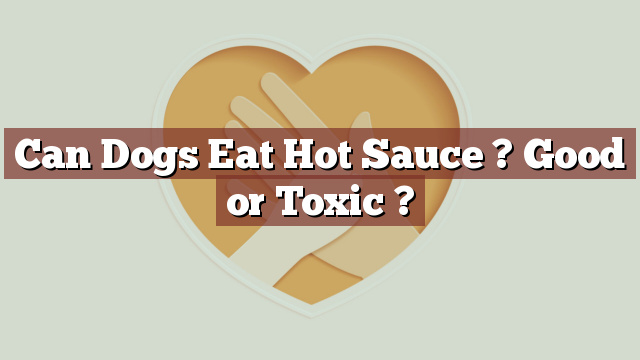Can Dogs Eat Hot Sauce? Good or Toxic?
It is important for pet owners to be aware of the foods that are safe and suitable for their furry friends. Hot sauce is a popular condiment that many people enjoy, but it is crucial to consider whether it is safe for dogs to consume. In this article, we will explore the nutritional value of hot sauce for dogs, discuss if dogs can safely consume hot sauce, potential risks and benefits, and what to do if your dog accidentally consumes hot sauce.
Nutritional Value of Hot Sauce for Dogs
Hot sauce is primarily made from ingredients such as chili peppers, vinegar, and spices. While it may add flavor to our meals, it does not offer any significant nutritional value for dogs. Dogs have different nutritional needs compared to humans, and they require a balanced diet that includes protein, carbohydrates, fats, vitamins, and minerals. Hot sauce does not provide these essential nutrients, making it an unnecessary addition to a dog’s diet.
Can Dogs Safely Consume Hot Sauce or Is It Toxic?
Common sense and expert opinion agree that dogs should not consume hot sauce. The primary reason is that the spicy nature of hot sauce can cause gastrointestinal distress in dogs, including vomiting, diarrhea, and stomach pain. Additionally, capsaicin, the compound responsible for the spiciness in chili peppers, can be irritating to a dog’s sensitive digestive system.
Furthermore, some hot sauce varieties may contain additional ingredients such as garlic, onions, or artificial additives. These ingredients are known to be toxic to dogs and can lead to more severe health issues such as anemia or damage to the red blood cells.
It is crucial to note that different dogs may have varying degrees of tolerance to spicy foods. However, even if a dog shows no immediate adverse reactions, it is still best to avoid feeding them hot sauce due to the potential long-term consequences.
Potential Risks and Benefits of Dogs Eating Hot Sauce
The risks of dogs consuming hot sauce outweigh any potential benefits. While some pet owners may argue that a small amount of hot sauce can provide certain health benefits, such as boosting metabolism or improving circulation, these potential benefits are minimal and not worth the potential risks.
As mentioned earlier, hot sauce can cause digestive upset, leading to discomfort and potential dehydration. The ingestion of toxic ingredients commonly found in some hot sauce varieties can be life-threatening to dogs, especially if consumed in large quantities.
It is important to remember that dogs have different digestive systems compared to humans. What may be safe and enjoyable for us can be harmful and even toxic to our furry companions.
What to Do if Your Dog Accidentally Consumes Hot Sauce
If you suspect or know that your dog has consumed hot sauce, it is essential to take prompt action. Monitor your dog’s behavior for any signs of distress, such as vomiting, diarrhea, excessive drooling, or abdominal discomfort. If your dog exhibits any of these symptoms or if you have concerns, contact your veterinarian immediately. They will be able to assess the situation and provide appropriate guidance based on your dog’s specific circumstances.
Conclusion: Hot Sauce is Not Recommended for Dogs
In conclusion, it is best to avoid feeding hot sauce to dogs. The spicy nature of hot sauce can cause digestive upset and discomfort in dogs, while the potentially toxic ingredients commonly found in some varieties can pose serious health risks. Dogs have different nutritional requirements compared to humans, and hot sauce does not provide any significant nutritional value for them.
It is always important to prioritize the well-being of our furry friends and provide them with a balanced diet that meets their specific nutritional needs. If you have any concerns or questions about your dog’s diet, consult with your veterinarian for professional advice and guidance.
Thank you for investing your time in exploring [page_title] on Can-Eat.org. Our goal is to provide readers like you with thorough and reliable information about various dietary topics. Each article, including [page_title], stems from diligent research and a passion for understanding the nuances of our food choices. We believe that knowledge is a vital step towards making informed and healthy decisions. However, while "[page_title]" sheds light on its specific topic, it's crucial to remember that everyone's body reacts differently to foods and dietary changes. What might be beneficial for one person could have different effects on another. Before you consider integrating suggestions or insights from "[page_title]" into your diet, it's always wise to consult with a nutritionist or healthcare professional. Their specialized knowledge ensures that you're making choices best suited to your individual health needs. As you navigate [page_title], be mindful of potential allergies, intolerances, or unique dietary requirements you may have. No singular article can capture the vast diversity of human health, and individualized guidance is invaluable. The content provided in [page_title] serves as a general guide. It is not, by any means, a substitute for personalized medical or nutritional advice. Your health should always be the top priority, and professional guidance is the best path forward. In your journey towards a balanced and nutritious lifestyle, we hope that [page_title] serves as a helpful stepping stone. Remember, informed decisions lead to healthier outcomes. Thank you for trusting Can-Eat.org. Continue exploring, learning, and prioritizing your health. Cheers to a well-informed and healthier future!

